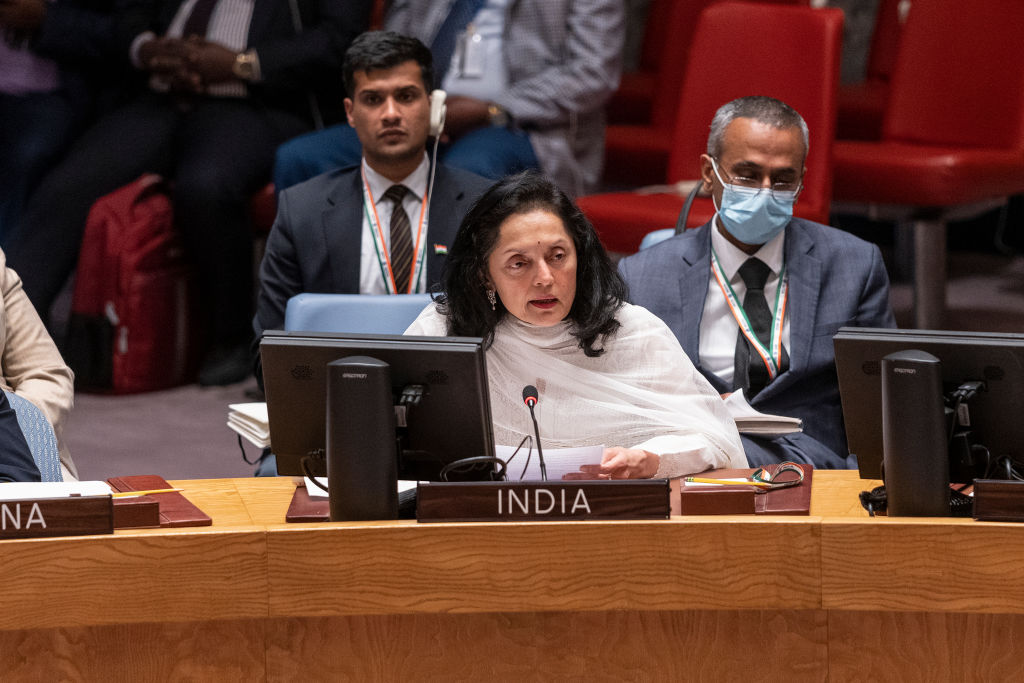In an indirect reference to Pakistan, India’s Permanent Representative to the UN, Ruchira Kamboj, on Thursday criticised Islamabad at the United Nations, saying that it harbours a “most dubious track record.”
Kamboj’s remarks came in response to the “destructive and pernicious” comments made by Pakistan’s Permanent Representative to the UN, Munir Akram, targeting India, which included references to Kashmir, the BJP, Rashtriya Swayamsevak Sangh (RSS), and Indian Muslims.
In her address to the UN General Assembly meeting on the agenda item ‘Culture of Peace’, Kamboj emphasized that India’s rich history, diverse traditions, and profound philosophical tenets deeply embody the culture of peace. She highlighted the doctrine of non-violence, or Ahimsa, as the “bedrock of India’s commitment to peace.”
Kamboj said: “In this Assembly, as we endeavour to cultivate a culture of peace amid these challenging times, our focus remains steadfast on constructive dialogue. We thus choose to set aside the remarks from a certain delegation which not only lack decorum but also detract from our collective efforts due to their destructive and pernicious nature.”
“We would strongly encourage that delegation to align with the essential principles of respect and diplomacy that must always guide our discussions or is that too much to ask of a country that harbors a most dubious track record on all aspects in itself,” she added.
In her remarks, Kamboj said that India is concerned by the escalating attacks on churches, monasteries, gurudwaras, mosques, temples and synagogues. She asserted that these acts require a “swift and united response” from the global community.
“In our world today, we face significant challenges arising from geopolitical tensions and uneven development. The growing intolerance, discrimination, and violence based on religion or belief indeed demand our urgent attention. We are particularly concerned by the escalating attacks on sacred sites, including churches, monasteries, gurudwaras, mosques, temples, and synagogues.”
“Such acts require a swift and united response from the global community. It is crucial that our discussions therefore forthrightly address these issues, resisting political expediencies. We must tackle these challenges directly and ensure that they are solved. central to our policy, dialogues and international engagements,” she added.
Kamboj said that terrorism stands in direct opposition to the culture of peace, as it sows discord and breeds hostility. She called it essential for member states to work together to nurture a genuine culture of peace.
“I will also state that terrorism stands in direct opposition to the culture of peace and the core teachings of all religions which advocate compassion, understanding and coexistence. It sows discord, breeds hostility and undermines the universal values of respect and harmony that underpin cultural and religious traditions worldwide. It is essential for member states to work together actively to nurture a genuine culture of peace and to view the world as a united family, as my country strongly believes, ” Kamboj said.
She emphasised that significance of peace is “paramount” in today’s global landscape.
“It champions dialogue over discord, urging nations to favour diplomacy and communication above confrontation or warfare. This is especially relevant as we navigate ongoing conflicts worldwide that demand open communication dialogue, and mutual respect to forge lasting peace.”
Stressing that ancient Indian texts promote values of harmony and compassion, Kamboj said, “As far as my country, India, is concerned, the culture of peace is deeply ingrained in its rich history, diverse traditions, and profound philosophical tenets. Ancient Indian texts like the Vedas and the Upanishads promote values of harmony, compassion, and non-violence, principles that have shaped my country’s ethos.”
Kamboj noted that India’s cultural mosaic is a testament to tolerance and co-existence. She stated that festivals like Diwali, Eid, Christmas and Nowruz transcend religious boundaries.
“The doctrine of Ahimsa, championed by Mahatma Gandhi, continues to be a bedrock of India’s commitment to peace. And with its remarkable religious and linguistic diversity, India’s cultural mosaic is a testament to tolerance and coexistence. Festivals such as Diwali, Eid, Christmas, and Nowruz transcend religious boundaries, celebrating shared joys among diverse communities. The country’s myriad languages, dialects, and cuisines, alongside its rich tapestry of races, colors, and landscapes, contributes to the resilience and richness of India’s composite culture.”
Highlighting that India has historically been a sanctuary for members of persecuted communities, Kamboj said: “India is not only the birthplace of Hinduism, Buddhism, Jainism, and Sikhism, but also a stronghold for Islam, Judaism, Christianity, and Zoroastrianism. It has historically been a refuge for persecuted faiths, illustrating its longstanding embrace of diversity.”
(With ANI input)




















